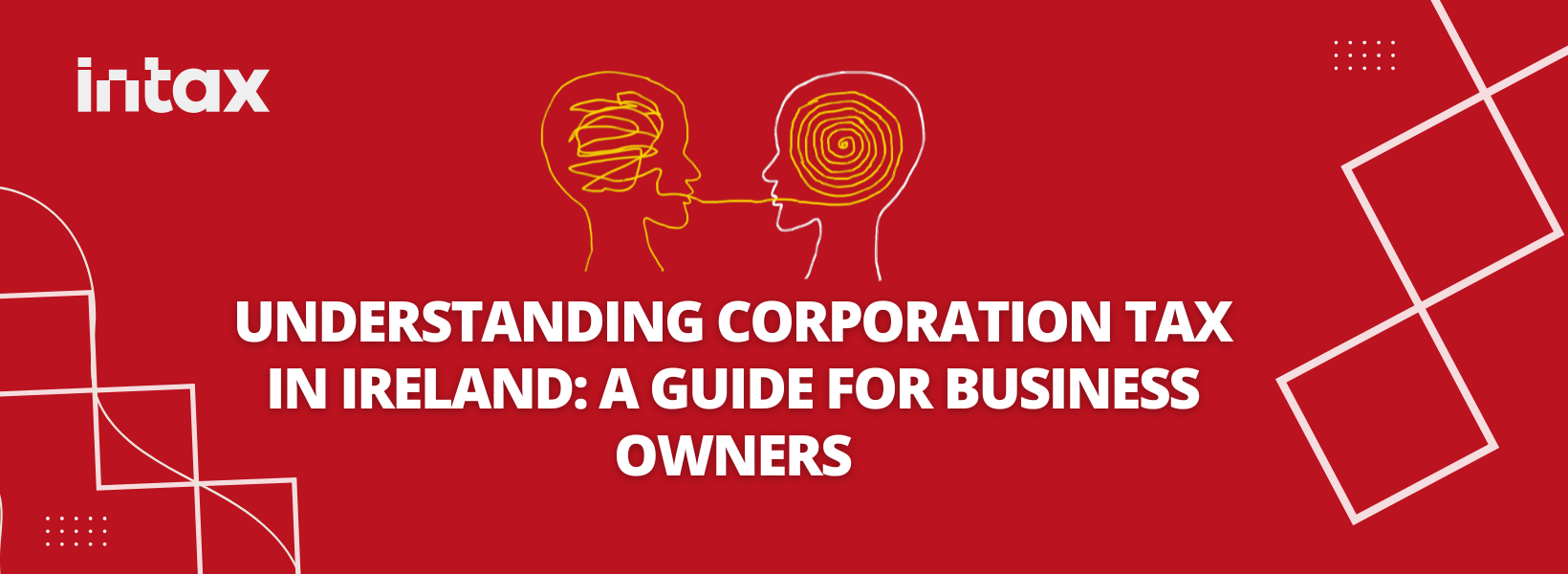Introduction
Navigating the complexities of corporation tax can be daunting for business owners, especially those new to the Irish tax system. This guide aims to demystify corporation tax in Ireland, providing you with a comprehensive understanding of how it works, what your obligations are, and how to ensure compliance with Revenue.ie regulations.
Corporation Tax (CT) is a critical aspect of operating a business in Ireland. Understanding your CT obligations ensures compliance and can lead to significant tax savings. This guide provides an overview of Corporation Tax in Ireland, including rates, filing requirements, and key considerations for business owners.
What is Corporation Tax?
Corporation Tax is levied on the profits of companies resident in Ireland, encompassing both income and capital gains. Non-resident companies are also subject to CT if they trade through a branch or agency in Ireland or receive profits from Irish rental property.
Corporation Tax Rates
Ireland applies two primary CT rates:
- 12.5%: Standard rate for trading income.
- 25%: Applied to non-trading income, such as rental and investment income, and income from certain trades.
Ireland’s competitive corporation tax rate has made it an attractive location for multinational corporations and small businesses alike.
Who Needs to Pay Corporation Tax?
All limited companies, public limited companies (PLCs), and some other types of corporate entities operating in Ireland are required to pay corporation tax. This includes:
- Irish-resident companies on their worldwide profits.
- Non-resident companies on profits derived from Irish activities.
Key Deadlines and Filing Requirements
Understanding the deadlines and filing requirements is crucial to avoid penalties and interest charges. Here are the key dates and obligations:
1. Accounting Period: The accounting period is typically 12 months, but it can vary. Corporation tax is calculated based on the profits earned during this period.
2. Preliminary Tax: An estimate of the current year’s tax liability, payable by the specified due date. Preliminary tax is an advance payment of your corporation tax liability. It must be paid within 21 days of the end of your accounting period.
Want a deeper understanding of Preliminary Tax? Read our blog, “Understanding Preliminary Tax: What Irish Business Owners Need to Know,” for a detailed guide!
Pro Tip: Ensure your preliminary tax payment is at least 90% of your final liability to avoid interest charges.
3. Annual Return: Companies must file an annual return with the Companies Registration Office (CRO) and a corporation tax return (Form CT1) with Revenue.ie. CT1 is an annual Corporation Tax return, detailing income, expenses, and tax calculations.
The deadline for filing the annual return is 9 months after the end of the accounting period.
4. Balance of Tax: Any remaining balance of corporation tax after preliminary payments, payable by the return filing date.
5. 46G Form (Company): The 46G Form (Company) reports payments made to third parties, ensuring transparency in business transactions for tax compliance.
Pro Tip: Ensure timely and accurate filing to avoid penalties. Utilizing ROS can streamline the process and provide access to various resources.
Calculating Corporation Tax
To calculate your corporation tax liability, follow these steps:
- Determine Your Taxable Profits:
- Start with your gross profits and deduct allowable expenses, capital allowances, and any losses carried forward.
- Apply the Relevant Tax Rate:
- Use the 12.5% rate for trading income and the 25% rate for non-trading income.
- Deduct Any Tax Credits:
- Certain tax credits may be available, such as the Research and Development (R&D) tax credit.
- Calculate Preliminary and Final Tax:
- Ensure you meet the preliminary tax requirements and pay any remaining balance by the final tax deadline.
Common Deductions and Allowances
Understanding what deductions and allowances are available can significantly reduce your corporation tax liability. Some common ones include:
- Capital Allowances: Deductions for the wear and tear of qualifying capital assets, such as machinery and equipment.
- Trading Loss Relief: Losses incurred in previous years can be carried forward to offset future profits.
- R&D Tax Credit: A generous tax credit for companies engaged in qualifying R&D activities.
Pro Tip: Regularly review available reliefs and consult with a tax professional to maximize tax efficiency.
Record-Keeping and Compliance
Maintaining accurate records is essential for compliance with Revenue.ie regulations. Ensure you keep detailed records of:
- Income and expenses.
- Assets and liabilities.
- Tax computations and payments.
Pro Tip: Use accounting software to streamline record-keeping and ensure accuracy. Regularly review your records to identify any discrepancies early.
Penalties for Non-Compliance
Failure to comply with corporation tax obligations can result in significant penalties, including:
- Late filing penalties.
- Interest on overdue tax.
- Potential audits and investigations by Revenue.ie.
Pro Tip: Always file your returns and make payments on time to avoid penalties. If you anticipate difficulties, contact Intax.ie to discuss possible tax solutions tailored specially for you.
Seeking Professional Advice
Given the complexities of corporation tax, seeking professional advice from a tax consultant or accountant can be invaluable. They can help you:
- Optimize your tax position.
- Ensure compliance with all regulations.
- Identify potential tax savings.
Conclusion
Understanding and managing Corporation Tax in Ireland is crucial for the financial health of your business. By staying informed about your obligations, maintaining accurate records, and seeking professional advice when needed, you can ensure compliance and optimize your tax position. Whether you’re a startup navigating tax for the first time or an established business looking to optimize your tax strategy, being proactive is key.
🔹 Need expert assistance with Corporation Tax? Intax.ie offers tailored tax solutions to ensure compliance, maximize deductions, and streamline the filing process. Get in touch today and let our tax professionals help you stay ahead!





